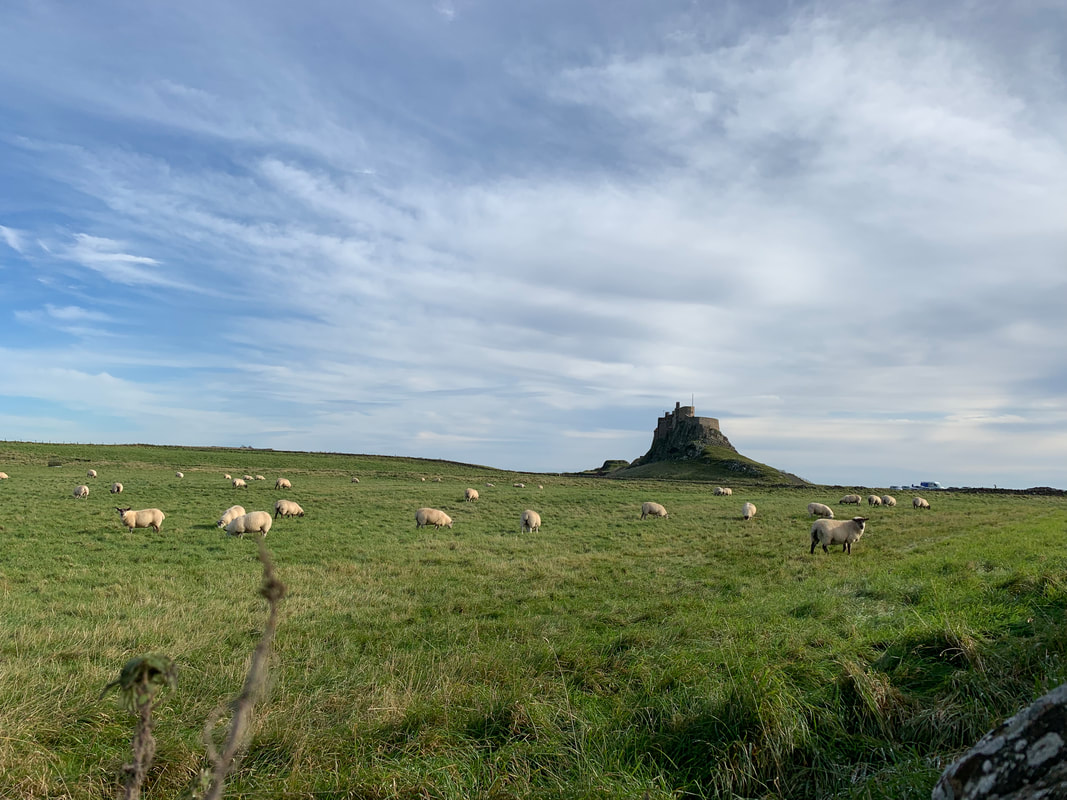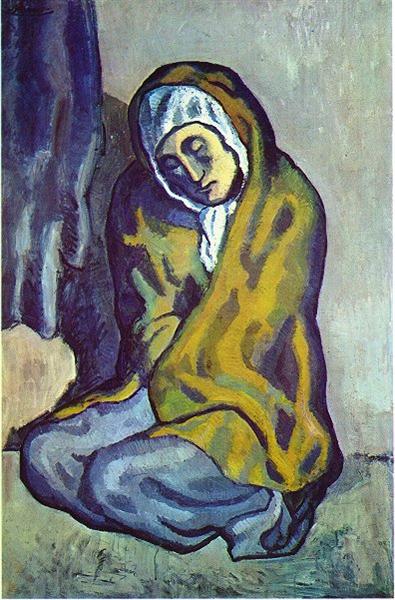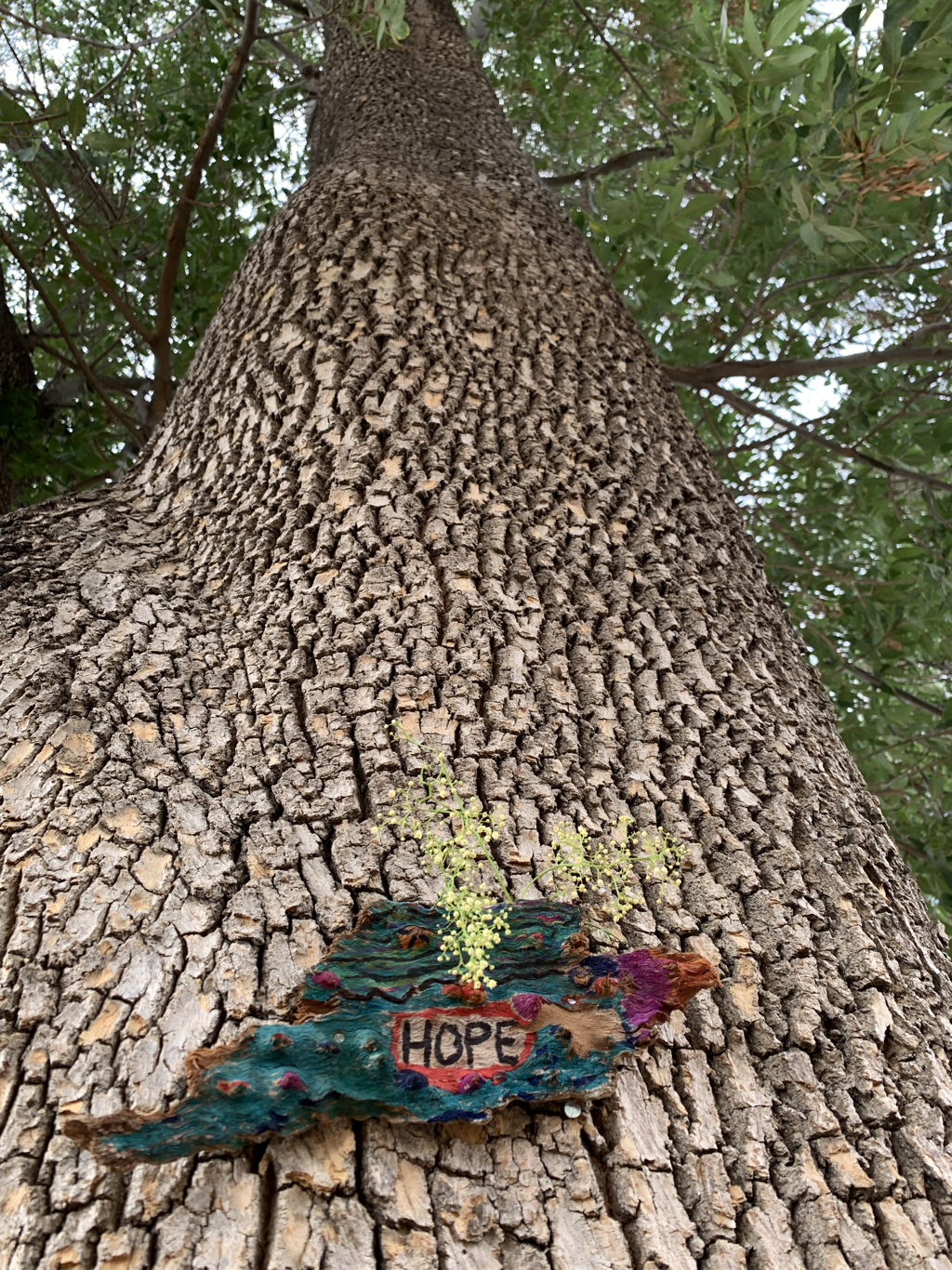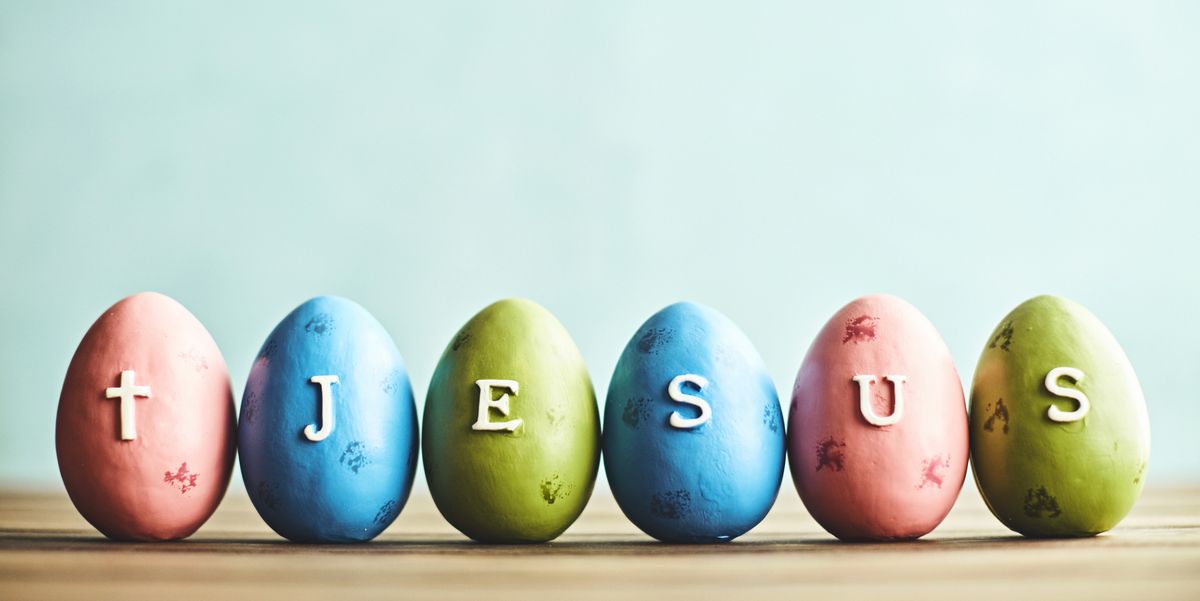|
Back in 2014 I had the pleasure of preaching to my entire family in at a special service in a very special place. It was in a little church on Colonsay, an island off Western Scotland where my ancestors had emigrated from.
I confess I was not very keen on the idea of having to write a sermon while on vacation. And I was even less excited about preaching one in front of my family who disregards pretty much anything I have to say. But my mom had her heart set on attending Sunday service. And unless another minister washed up on shore...well, the responsibility was all mine. This is not to say I didn’t try to get out of doing it. I told my mother that it’s not very kosher to just wander into a church and use it like we owned the place. She reminded me that we are family here, and then pointed to the church sign that said, "welcome all.” When I pointed out the large heavy chain that locked the giant wrought iron gate blocking the front door of the church, my mom just calmly said, “That’s just to keep the sheep out.”
If you were to visit this island, you’d instantly notice the abundance of sheep that roam everywhere. Without any real threats of danger on the island, the folks of Colonsay have taken the concept of free-range to a whole new level.
Now, whenever you vacation in a place where the sheep out-number humans 25-to-1, there are some things you need to know. First, going barefoot really isn’t an option. Second, sheep are shy but not in the way we think. They don’t like humans walking up to them, but have no problem walking up you and taking whatever they want. I also learned that sheep have no sense of personal space. They will stick their nose into everything – they are forever curious to see what a Scotsman wears under his kilt. Another thing about sheep is they are not as dumb as we make them out to be. Which brings me back to what my mom said about the giant chain wrapped around the heavy wrought-iron gate. Somewhere in the church’s 200-year history, the sheep had figured out how to unlatch the old wooden door that leads inside. So they put up a gate to keep them out. Let that sink in. The sheep recognized the church as a sanctuary, a safe place to seek shelter from the heavy storms that frequently passed over the island. But for those who like to have a nice and pretty church, did whatever they could to keep them out. The Bible offers so many allegories about shepherds and sheep. The most well-known is probably the 23rd Psalm.
In John’s gospel, Jesus builds upon this poem to describe himself to his trusted disciples. Click here to read John 10:11-18.
This reading is part of a series of seven "I Am" statements in John’s gospel that Jesus says to reveal his true self to his disciples. There’s the I am the true vine, I am the bread of life, I am light, I am the way, and today’s "I am the good shepherd." Most of us live in cities and big towns. That means we are far removed from the rural pastures where sheep are often found. However, in 1st century Palestine, sheep and shepherds were a part of the landscape like billboards are today along our highways. Just as it is on Colonsay, it would have been impossible not to notice them. Even a blind person could tell they were there from their sounds and smells. Thanks to all the sheep, shepherding was a common occupation. A humble one at that. But it could prove to be physically, mentally, and emotionally exhausting work. It was certainly no 9-to-5 gig. As John points out, it takes a to truly special person to fully commit to the duties of the position – to be away from home for weeks on end, to keep track of each animal, to chase after them and lead them away from unstable cliffs and dark ravines. And there was always wolves, thieves, and other threats that might require the shepherd to put his life in harms way to protect the flock. Not everyone is willing to do this. But Jesus says, “I Am.” He says, “I am the good shepherd. I will lay down my life for my sheep.” Five weeks into the Easter season, we know what that means. But imagine hearing it for the first time, and then seeing it come into being on the cross. You see, Jesus was not only the good shepherd. He was also the sacrificial lamb.
How do Jesus’ words speak to you as a follower, a disciple?
Perhaps you see yourself as a sheep? Or maybe as a shepherd? But do you see yourself as both? Hold on to that thought as I tell you a few more things about sheep. They are nothing like cows. Physical differences aside, cows are herded from the rear; often with the ranch hand shouting and prodding them along. Sheep, on the other hand, prefer to be led. Unlike cows, they do not follow blindly as the old maxim suggests. They will only follow the voice of their shepherd. The sheep will follow willingly because the shepherd has built a relationship of trust with them. The shepherd knows which sheep are cranky in the morning, which ones will occasionally bite, lag behind or wander off. He knows this because he’s chased after them; fallen in the mud with them; picked thorns from their hoofs. He has learned to love them in spite of their smell, and all their constant noisy bleating and baaing. Many years ago, Pope John Paul II said, “God has thought of us from eternity and has loved us as unique individuals. He has called every one of us by name, as the Good Shepherd calls His sheep by name.” When Jesus says, "I am the Good Shepherd" he is telling us that he cares for us like God has cared for him. We know that we can trust him and follow him, because we know what he is willing to do for us. He understands what we are going through because he has also gone through it himself.He knows what our dark valleys are like, because he has walked through them. He knows how easy it is for us to be scared and scattered by the wolves of this world, that even the most loyal sheep can stray and fall into dark ravines. Though we are not perfect, our Good Shepherd is always ready to come to our rescue. But here’s the thing. Jesus is telling this to his disciples, not only to reveal who he is but to inform them of who they are being called to be. Those who follow Jesus’ voice are also called to be like him – to be both a sheep and a shepherd. To be loved and the one who loves. Like Jesus, we are called to lead others to God’s redemptive grace, and to do by abiding in the will of God. That is to say, to love others as God loves us. To be like the Good Shepherd, we must be willing to set aside our self-interests and help others find quiet waters and green pastures. We must be willing to lay down our differences and lead our enemies to the table of peace. We must care for all of the sheep – feeding them, tending to their needs, and guiding them safely through the darkest valleys. Giving until their cup overflows. This is the life of sacrificial love, the starting point of our Christian identity. This is what it means to live Christ like, in imitation of the One who came to bring us home to God. Through him, goodness and mercy will follow us all the days of our lives. Mahatma Gandhi famously said, “Where there is love there is life.” Perhaps this is why being a sheep is often more attractive than being a shepherd. A sheep just has to love the shepherd enough to follow him. But the life of the shepherd requires one to love the sheep, no matter the cost. As C.S. Lewis reminds us, “To love at all is to be vulnerable.” No one knows this better than Jesus, our Good Shepherd. Everything Jesus has done for us is born from the love that he has for us. If we are to be like him, to truly follow him in all the ways of love, then we must resist the urge to live for ourselves, to set aside our own wants and desires in order to help one another; even if it means one must preach a sermon while on vacation. And so I did. As I stood, facing my family sitting in the worn wooden pews of that beautiful old church, a summer storm blew over the island. Outside the window I saw a bunch of wet, smelly sheep moving towards the church...looking for shelter. A strong wind blew hard against the building - causing that metal gate to slam shut. It sent a loud clang reverberating throughout the sanctuary. In it echoed my mother’s words “it’s there to keep the sheep out.” No church should keep the sheep out. Instead we are called to be out there with them. The church isn’t a building. It’s people loving one another. Sometimes you are the sheep, on the receiving end of that love. Other times you are the shepherd - loving those around you. Just as God opened the Easter tomb, revealing to the world the real power of love, so too has Christ opened our hearts. So as you leave here today, as you go out into the world, remember that you are more than just a sheep. You are resurrection people. And in us, and through us, Jesus lives. He lives every time love is manifested through us. And there are so many ways to do this. He lives every time we mask up and help our neighbors struggling through the pandemic. He lives when we march on our streets, demanding justice and equality for all people. He lives when everyone of God’s sheep are valued no matter who they love, or who they vote for. He lives when we welcome the stranger among us, and whenever we care for those lost and frightened sheep we encounter along the way. Whenever we make love come alive in the world, Jesus lives. And so do we. For that’s what happens when sheep and shepherd become one - one flock dwelling in the house of the Lord all the days of our lives. Adapted from a sermon given on May 3, 2015 which you can read here.
0 Comments
Jesus doesn’t show up unexpected. He shows up in the other. He comes to us every day – alive and hungry. Who's Going To feed him?
If you are a lover of zombie movies this passage could have your head spinning in all sorts of directions.
The last time the disciples saw Jesus, he was dead on a Roman cross. Now he’s standing in the room with them. And they are freaking out. Who could blame them? Imagine going to the funeral of a loved one only to come home and find that person in your kitchen eating a bowl of cereal like nothing ever happened. Now, the first thing we learn in this story is - nobody expects Jesus to be here. But all of a sudden, he is. Zombie narrative aside, this is a subtle but important point. As the old saying goes, “It’s best to be good because you never know when Jesus is going to show up.” And trust me, he will. Next, Jesus greets them. “Shalom!” which is loosely translated into English as, “Peace be with you.” A bit ironic don’t you think? It’s hard to find peace when you’re freaking out because the dead one is no longer dead. In Hebrew “shalom” means much more than “peace.” According to Kirk Kubicek, "It’s a word used to convey that all is well with the world; all is fair, all is just; all is the way God means it to be." I like this idea. So much so, I am going to borrow from it. You see, all is not well. Not now. Not then. Up until this point, all the disciples know is the bad guys won. They, who are us, watched their teacher be unjustly condemned and wrongfully murdered. Their fear is legit. As far as they know they’re next. But here comes Jesus – showing up to let them know that all is right in the world. This is the way God wants it to go down. Nevertheless, the disciples are happy to see their teacher again; to embrace him in the flesh. And after their strange reunion is out of the way, Jesus becomes one of us again. He wants to know, “What’s to eat?” Christ is not only alive. He’s also hungry. And wants us, the disciples, to feed him. The disciples, us, give him some leftover fish. I suspect this isn’t what Jesus is hankering for. Because after he eats, Luke says Jesus opens their minds to understand the scriptures. Jesus isn’t hungry for food. He’s hungry for our well-being. He wants to make sure that we understand the word of God, what the laws and the prophets speak of, because it’s in there we find all the ways to make everything is right in the world - the way God means it to be. Jesus takes the fish but feeds us scripture so we will always hunger for what is just and right. This is important because this had not been the case with most of the religious teachers in Jesus’ day. Jesus was upset with the ways his religious contemporaries were using scripture to their advantage. Kubicek writes, “Instead of bringing God’s people, all people, together, the administration and understanding of God’s 638 rules, beginning with the First Ten, was being used to separate people more than bring them together.”
watch the message here
Let’s be honest. What ticked off Jesus then still ticks off Jesus today.
Think about all the times you’ve heard Christians slice up Scripture to validate why it’s okay for them to discriminate and exclude others from worshiping God? To borrow from Jesus, they notice the speck in someone else’s eyes but cannot see the log that’s in their own (Matthew 7:3). As we have come to see in recent years, such behavior pushes people away from the church and from receiving God’s unconditional love. This is not the way to bring about God’s shalom in the world, is it? Christ is alive. And Christ is hungry. Hungry for justice, fairness, and equality for all people – not some people, not most people, not lots of people. But all people. As churches are battling it out over “who’s in and who’s out,” the world is starving, literally and figuratively, for the way God means it to be. The way of peace, the way of love. In everything Jesus did, he did to open our eyes and hearts to the way of God’s never-ending love. And now he’s calling us to use this love to satisfy the hunger of the world. He made that perfectly clear when he said that the hungry were to be fed; the naked clothed; the prisoner visited; the sick made well; the stranger welcomed (Matthew 25:31-46). This Jesus, the one who identified himself as the foreigner mother pleading for her child’s life, the one who saw his reflection in the eyes of the cheating tax collector, the leper cast out from society, the war vet begging on the street, and the frightened prostitute crying out for hope. This Jesus who we have come to worship and glorify today – the one who took our pain and suffering as his own, the one who sat with the dying and wept with the bereft – never turned away from people. He turned towards them. He made sure everyone had their fill of God’s loving grace. Even as they killed him. You see this Jesus – who is hungry for something more than a piece of broiled fish – actually meant it when he said, “What you do to them, you do also to me”? Earlier I said, “you never know when Jesus is going to show up.” But here’s the truth. Jesus doesn’t show up unexpected. He shows up in the other. He comes to us every day – alive and hungry. But who’s going to feed him? How will we respond when we see him? Afraid, in disbelief? We can pretend Easter was something that has come and gone, as if it is no longer relevant. Or we can feast on the words of Jesus who says, “Repentance and the forgiveness of sins are to be proclaimed …to all nations, all persons.” Jesus tells the disciples, who are us, “You are a witnesses of these things.” But will we go out and feed the world as living witnesses to this Shalom he speaks of and died for? Or will we simply offer him a piece of leftover fish? (Kubicek) As you leave here today, I hope you will remember that Christ is here, offering you God’s shalom. This is not a greeting. It’s a call to participate in God’s kingdom. We are his church, a holy body broken for the world. He calls us to make our lives, our homes and churches, a place where all people are not only welcomed but fed, nourished, and satisfied with the redemptive love of God’s grace and mercy given to all through Christ Jesus. St. Augustine said it like this. “You are the body of Christ. In you and through you the work of the incarnation must go forward. You are to be taken; you are to be blessed, broken, and distributed; that you may be the means of grace and the vehicles of the eternal love.” For some reason Christ has made us a partner in his ministry. So it’s my hope for you, his beloved, that you will go out from here, fearlessly and faithful, to be who God has called you to be. A holy and sacred feast for a very hungry world. Work Cited Kubicek, Kirk Alan. Jesus Is Hungry. (April 19, 2015).
Last week, Palm Sunday, we spoke of the people who lined the streets to celebrate Jesus’ arrival into Jerusalem. But that celebration was short lived. Sometime after he shared a Passover meal with his disciples, Jesus’ enemies had him arrested. They hustled him through an unjust trial and convicted him of blasphemy - a crime punishable by death.
But because they were devout, law-abiding men, his enemies had to connive and convinced the Roman government do their dirty work. Before Pilate, Jesus was beaten and mocked, yet didn’t flinch before the emperor’s sword. Instead, he stood there silently as if to say, “What are you gonna do, kill me?” It was like Jesus knew God’s love and faithfulness was bigger than death. Still, Pilate gave him an insurrectionist’s cross. And well, you know the rest of the story. Then, on the day Jerusalem observed the Sabbath, God got busy. And here’s what happens next. Read: Mark 16:1-8 he said to them, “Do not be alarmed; you are looking for Jesus of Nazareth, who was crucified. He has been raised; he is not here. Look, there is the place they laid him.
Now Mark is considered to be the first of the four gospels. His is a quick and to the point account of Jesus’ ministry. Throughout the ages, people have found all sorts of creative ways to make Mark’s Easter story come to life. Around 400 A.D. John Chrysostom, the archbishop of Constantinople, preached one such sermon. It was so good the Church argued it should be preached every year.
Given the divisive state of American Christianity these days, today seems like the perfect time to bring back this famous Easter message written by one of the early church fathers. Even though it’s over 1,800 years old, his words are still relevant and speak to every heart. He begins by asking:
What an amazing gift John Chrysostom gave to the world. A simple invitation to everyone to come and feast on the glory of God! When we first gathered as a church, our invitation was simple. Come and see.
Come and see the church from a new perspective. Come and see yourself through the eyes of God’s love for you. Jesus often described God’s love as a banquet, a feast like no other. A feast that Jesus has invite you to attend. The table has been set. There is a seat waiting for you. It doesn’t matter who you are or when you arrive, Jesus said you are welcome to this feast. Whether or not you believe a little, or a lot, or not at all it does not negate what God has done for you through Christ Jesus. Whether you are a sinner or a saint, God destroyed death, so that you might live and enjoy this everlasting feast. Think about that for a moment. God destroyed death, so that you might live. It doesn’t matter what the world thinks of you, or how it tries to define you. It doesn’t matter how you see yourself! This is a day that the Lord has made. No longer will darkness overpower you. Jesus Christ is giving you the radiant light of Easter. In this light, Jesus sees you as you really are – a beloved child of God. He is calling us all to the feast. Today, as we gather to celebrate God know that God is here to celebrate you. Whether you see yourself as worthy or not, the table is set, the food is already cooked. There is enough for everyone to get more than their fair share. The celebration is on. The only one stopping you from attending … is you. Every Easter for as long as I can remember, we have hosted a big Easter brunch. Kathleen would make all kinds of great dishes. And our friends and family bring their best. Mouth-watering aromas mingled with the electrifying joy in the house. Around our table one would find ham, quiches, soups, charcuterie boards with different meats, bread and cheeses. Not to mention salads and vegetables prepared a dozen different ways. We’d load our plates. Then go back for seconds and thirds. The champagne was as plentiful as the laughter. We’d relax on the back porch, holding our stuffed bellies and watching the kids hunt for the remaining easter eggs. And then, desert would come. Cakes, pies, fruit, ice cream and chocolates and of course Easter candy. It’s a marvelous feast to say the least. A little reminder of the sweetness of heaven here on earth. Because of the pandemic, this didn’t happen last year. This year won’t be any different. Many of us are still unable to be with our friends and family. Yet we all still have a reason to rejoice. The tomb is empty. Death no longer holds us captive or cripples us with fear. Christ is Alive. And he’s calling us to the party. A never-ending feast of unlimited and boundless compassion. A banquet where we all delight in forgiveness and have our fill of mercy. It is here, with Christ, that God pours into the cups of our heart grace upon grace until it spills over and splashes on the tables and floors. Best of all...No one is turned away. Because no one is beyond the boundaries of God’s eternal love. Somewhere along the way, we have forgotten this. Somewhere along the way, we tried to capture God in a box. But as the Easter tomb has shown us, God cannot be contained. What God did then through Christ, God did once and for all. Through him we are free; given a new life. Today the Incarnate Christ is calling us to embrace this new life and the fullness of God’s faithfulness that broke through death on that first Easter morning. From his empty tomb, the words of God still reverberate, “You are my beloved children. And my love is everlasting.” And so I invite you once again to come and see that God’s love is stronger than death. And anything that belongs to God will never go to waste. Jesus calls out to you and me. Come and see. His is an invitation to receive God’s love that empowers you to take the Way that Jesus has taken before you: a way that gives you true joy and peace and enables you to make the love of God visible in this world. Come and see what the Lord has made for you, out of great love for you. The table is set. The feast has begun. So come. The only one stopping you is you. |
Ian MacdonaldAn ex-copywriter turned punk rock pastor and peacemaker who dedicates his life to making the world a better place for all humanity. "that they all might be one" ~John 17:21“Prius vita quam doctrina.”
~ St. Thomas Aquinas (1225–1274) * “Life is more important than doctrine.”
Archives
June 2024
|




